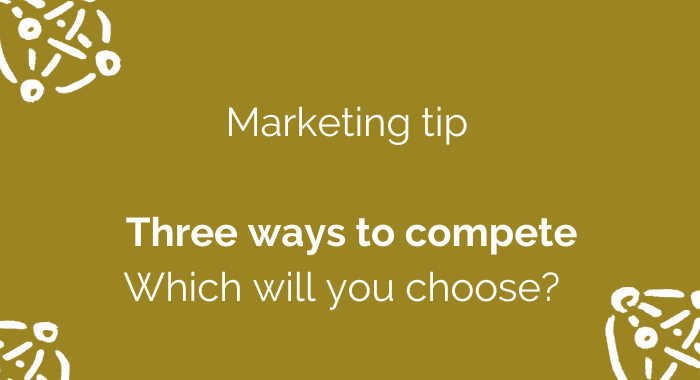How will you compete?

What do you do to beat your competitors? You've basically got three options. It doesn't work well to try to do all of these, or even two of them.
Which will you choose?
Compete on price
Some businesses compete on price, focusing on controlling their costs so they can keep their prices down. There will always be a market for anything that is cheap - but remember that value for money is also important. Cheap and value for money aren't necessarily the same...
There are downsides to competing by being cheaper (or offering big discounts). A competitior may undercut you, and then you're left without a strong unique selling point.
Some potential visitors may wonder whether you offer a good service if you're cheap: it's up to you to show how you offer value for money.
Competing on price isn't just about being the cheapest. Some businesses pride themselves on their higher prices and reputation for excellence. Their customers are actually proud they can afford to pay those higher prices, perhaps congratulating themselves on their good taste. Obviously the service has to match... In this sense you'd be competing by being better, not just more expensive than others.
Differentiated approach
This relies on having a truly special or unique product or service, on offering something that is ‘unique’ and genuinely different.
In the tourism industry, reputation goes a long way towards this. A guesthouse may have the same number of bedrooms and basic services as its neighbour, but could claim to be different thanks to other elements such as the view from bedroom windows, a very pleasant garden, or a cosy lounge stocked with boots, magazines and board games. Remember, it's not enough to just think you're different - you need to be able to demonstrate this and show potential visitors that you offer something special. In this example, you'd need to really promote the lounge and its relaxing atmosphere, to make it a very strong selling point and help visitors imagine themselves being able to relax there.
The differentiated approach relies on excellent customer service and creative marketing to stay ahead of competitors. The most important factor is identifying key strengths and highlighting them.
A focused or niche approach
This approach means concentrating on particular markets or niches, understanding their needs completely and developing products and promotions that are 100% targeted to them.
A focused approach is often used by smaller businesses without massive resources but with an excellent understanding of their target markets. Instead of using an ‘all things to all people’ or ‘something for everyone’ approach, they can operate within niche markets that are too small to attract the ‘big boys’.
If you take this approach, it can be easier to become better known as say the most family-friendly accommodation in x location, and marketing becomes much easier and more targeted.
Which competitive method will you choose?


0 comments
Leave a comment
Please log in or register to post a comment